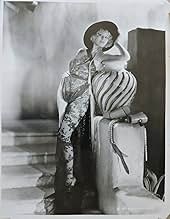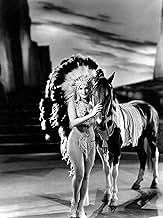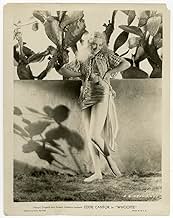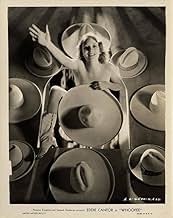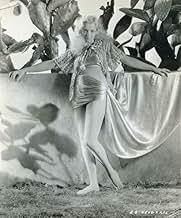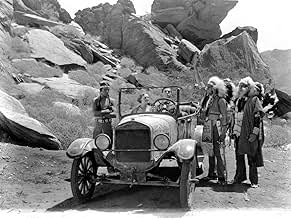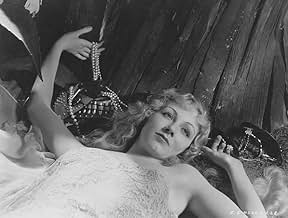Ajouter une intrigue dans votre langueWestern sheriff Bob Wells is preparing to marry Sally Morgan; she loves part-Indian Wanenis, whose race is an obstacle. Sally flees the wedding with hypochondriac Henry Williams, who thinks ... Tout lireWestern sheriff Bob Wells is preparing to marry Sally Morgan; she loves part-Indian Wanenis, whose race is an obstacle. Sally flees the wedding with hypochondriac Henry Williams, who thinks he's just giving her a ride; but she left a note saying they've eloped! Chasing them are j... Tout lireWestern sheriff Bob Wells is preparing to marry Sally Morgan; she loves part-Indian Wanenis, whose race is an obstacle. Sally flees the wedding with hypochondriac Henry Williams, who thinks he's just giving her a ride; but she left a note saying they've eloped! Chasing them are jilted Bob, Henry's nurse Mary (who's been trying to seduce him) and others.
- Réalisation
- Scénario
- Casting principal
- Nommé pour 1 Oscar
- 2 victoires et 1 nomination au total
- Sheriff Bob Wells
- (as John Rutherford)
- Cowhand
- (non crédité)
- Goldwyn Girl
- (non crédité)
- Cowhand
- (non crédité)
- Goldwyn Girl
- (non crédité)
- Ed - Cowhand
- (non crédité)
- Goldwyn Girl
- (non crédité)
- Goldwyn Girl
- (non crédité)
- Girl
- (non crédité)
Avis à la une
The tale that acts as a vehicle for all of Eddie Cantor's antics is a simple one, and one that is repeated in several films over the years - that of forbidden love between races. Sally, a white girl, falls in love with Wanenis, an Indian. Since such marriages were forbidden, Wanenis goes away into the wilderness to deal with the fact they cannot be together. In the meantime, Sally's father arranges for her to marry Sheriff Bob Wells. Wanenis returns on Sally's wedding day, not knowing it is her wedding day. When Sally sees Wanenis, she knows she cannot go through with the sham wedding and runs away. The fun comes in with how she runs away. She tells sickly Henry Williams (Eddie Cantor) that she and Bob are planning to elope, and that she needs him to drive her into the next town. However, she leaves a note for everyone else saying she has eloped with Henry. Not only is the vengeful sheriff, his men, and Sally's father soon hot on their trail, but Henry's aggressively love-sick nurse is after them too. Only Wanenis finds this whole thing an odd turn of events and takes a short cut to go looking for them, separate from the rest of the pack. Complications and opportunities for Cantor's always enjoyable remarks, eye movements, and musical interludes ensue.
This film survives intact in splendid shape, and the Technicolor truly yields a spectacular painted desert. Although best remembered songs from this film will always be title song "Makin' Whoopee" and "My Baby Just Cares For Me", both performed by Eddie Cantor, I also really liked the love ballad sung by the star-crossed lovers Sally and Wanenis -"I'll Still Belong to You". It has an operatic quality that is typical of love songs from that era, and oddly enough was written by Nacio Herb Brown of MGM songwriting fame.
Finally, let me mention the fact that some of the racial aspects of this film might leave the modern viewer squeamish such as the stereotypes of native peoples and the fact that Eddie Cantor usually appeared in black-face as part of his act and does here too. Try to remember that none of this is out of character for a film made 80 years ago and no mean-spiritedness was intended at the time.
Highly recommended for a chance to see Eddie Cantor in one of his best.
However, there are several things for a film buff to enjoy. The early two-strip Technicolor is quite nice and the print I've seen on TV is really quite gorgeous. (It seems strange that this, of all early talkies, would have been so well preserved.) Outside of Cantor's vaudeville style, Whoopee! feel nearly it's age. The camerawork can be quite clunky at times, like the jiggly attempt at an overhead shot during a dance number, but generally its acceptable for a simple musical. Additionally, the dances were the work of a young Busbey Berkley and you can tell it's his handiwork. Oddly, the dancers seem to have a problem dancing in-sync with one another, which seems to be a hallmark of every early musical I've ever seen.
There are lots of gags, and like the Marx Brothers films, so many that you can't catch them all. Also like the MB, some of the humor is topical, so audiences of today aren't going to get what people would laugh at in 1930.
Through all the jokes - many stupid and many clever - Cantor is a likable guy and also a good singer. As I wrote with another review (Roman Scandals) I am just sorry this talented man doesn't have his films out on DVD. The songs in here are decent, too, some of them very catchy. They also have the added attraction of having the Busby Berkeley joining in.
Make no mistake: this is a "sappy" film, so dated it's extremely stupid in spots....but definitely something for the film collector.
Surreal plot if full of schtick and is VERY non-PC (another reason to love it) as Blacks, Indians, Jews, Gays, and Goys get lampooned by Cantor and company.
Several terrific songs by Cantor, "Making Whoopee" and "My Baby Just Cares for Me," and a couple of excellent production numbers by Busby Berkley. Ethel Shutta (pronounced shoo-tay) was smashing in her "Stetson" number. I wish it had been longer.
Among the show girls and dancers are Betty Grable, Ann Sothern, Virginia Bruce, Claire Dodd, and possibly Jane Wyman, and Dean Jagger (of all people) plays a deputy.
The typical 20s romantic subplot between white Eleanor Hunt and Indian Paul Gregory is a drag and is the same things we've seen in the early Marx Brothers and Wheeler and Woolsey comedies.
Spencer Charters plays Underwood, Marian Marsh is his daughter, Jack Rutherford is the sheriff, etc.
The colors are great, the costumes fun. Flo Ziegfeld was involved show there are plenty of show girls in outrageous costumes.
Shutta is a find, but it's Eddie Cantor's show all the way and he's very very funny.
Le saviez-vous
- AnecdotesBased on a Broadway show produced by Florenz Ziegfeld Jr.. "Whoopee" opened at the New Amsterdam Theatre in New York on Monday, December 4th, 1928 and ran for 407 performances. Unfortunately, Ziegfeld lost everything in the stock market crash of 1929. At the time, "Whoopee" was still playing to full houses on Broadway. To bail himself out, Ziegfeld closed the show on Saturday, November 23rd, 1929 and sold the movie rights to Samuel Goldwyn. It is believed that the Broadway show could have run for another year.
- Citations
Mary Custer: Oh, poor Henry. Let me hold your hand.
Henry Williams: It's not heavy. I can manage. Hold your own hand.
- ConnexionsFeatured in Precious Images (1986)
- Bandes originalesCowboys
(1930) (uncredited)
Music by Walter Donaldson
Lyrics Gus Kahn
Performed by Betty Grable and chorus
Meilleurs choix
- How long is Whoopee!?Alimenté par Alexa
Détails
- Durée
- 1h 33min(93 min)

